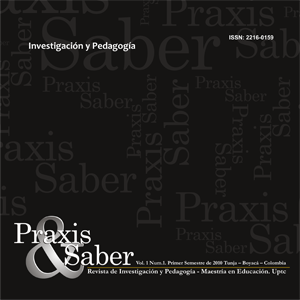Is the decolonization of the pedagogy possible?

Abstract
Which are the places for knowledge’s statement, production and legitimization from the pedagogy in Latin America? It is possible to change the knowledge`s ethics and policies that have been established in the colonialism and imperial post-colonialism’s logic following Mignolo? Which are the forms and the locus of knowledge and pedagogic thought’s production in Colombia and in Latin America? Which are the points of escape for the political statement from the pedagogy, from his historicity in Latin America? Is an effort to contribute with some elements of analysis to the functioning of the pedagogy inside the project modernity – post-modernity in Latin America from the de-colonial perspective’s studies. In addition, it tries to place the discussion in the historical frame of the pedagogic Latin-American thought, recapturing the contributions of Freire, Dussel and some authors of the critical pedagogy, in a bet for the recognition of those pedagogic critical speeches, that can be considered able to institute practices, projects and mobilizations of resistance within the Latin-American pedagogic and educational field, but that in turn, can be differentiated from the de-colonial and postcolonial studies.Keywords
Pedagogy, Latin-American Pedagogic Thought, Modernity-Post-Modernity, De-colonial Studies.
References
- Castro Gómez, Santiago (1996). Crítica de la razón latinoamericana. Colección: Historia y Cultura de Hispanoamérica. Barcelona: Libros Puvill.
- Dussel, Enrique (1980). La pedagógica latinoamericana. Bogotá: Nueva América.
- Escobar, Arturo (2004). Más allá del Tercer Mundo: globalidad imperial, colonialidad global y movimientos sociales anti-globalización. Revista Nómadas N.° 20. Producción de conocimiento, hegemonía y subalternidad. Bogotá: Universidad Central.
- Freire, Paulo (1986). Pedagogía del oprimido. México: Siglo XXI.
- Hopenhayn, Martín (1995). Ni apocalípticos ni integrados. Aventuras de la modernidad en América Latina. México: Fondo de Cultura Económica.
- McLaren, Peter (1997). Pedagogía crítica y cultura depredadora. Políticas de oposición en la era posmoderna. Barcelona: Paidós Educador.
- Mignolo, Walter (2005). Cambiando las éticas y las políticas del conocimiento: lógicas de la colonialidad y post-colonialidad imperial. Revista Tábula Rasa, N.° 3, enero-diciembre.
- Peñuela C., Diana Milena (2009). Pedagogía decolonial y educación comunitaria: una posibilidad ético-política. Revista Pedagogía y Saberes N.° 30, Bogotá: UPN
- Ubilla, Pilar. Ética y Pedagogía (o recreando a José Luis Rebellato) (2004). En: Madres de la Plaza de Mayo (comp.): Pedagogía de la resistencia. Buenos Aires: Editorial Cuadernos de Educación Popular. Universidad Madres Plaza de Mayo, pp. 9-25.
- Walsh, Catherine (2008). Interculturalidad crítica/pedagogía decolonial. En: Grueso, Arturo y Villa, Wilmer (editores): Diversidad, interculturalidad y construcción de ciudad. Alcaldía Mayor de Bogotá.
- Wallerstein, Immanuel (1999). Impensar las ciencias sociales. Límites de los paradigmas decimonónicos. México: Siglo XXI.
Downloads
Download data is not yet available.